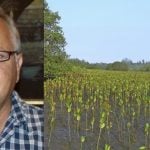To celebrate its 60th birthday, the nation of Madagascar held its largest ever tree-planting ceremony, with a million seedlings going into the ground in just a few hours after the speeches concluded. The country is preparing to plant a million trees for each year of its six decade history.
“The government has the challenge of making Madagascar a green island again. I encourage the people to protect the environment and reforest for the benefit of the future generations,” said President Andy Rajoelina at the January launch event in Ankazobe district, 100 kilometers (60 miles) northwest of the capital, Antananarivo.
According to two Madagascar writers published at Mongabay, the highly-publicized campaign comes one year after Rajoelina’s election on a platform that promised to “Make Madagascar green again.” It is the culmination of months of hard work by many organizations amassing around 100 million seeds to place into cultivated nursery beds—with schools, NGOs, government ministries, and even the army lending a helping hand.
Some officials supporting the project worry there won’t be enough follow-up to ensure the trees make it to adulthood, but Madagascar’s environment minister vowed to provide support.
RELATED: Scientists Use Recycled Sewage Water to Grow 500-Acre Forest in the Middle of Egyptian Desert
“This time, the action will be continuous, and there will be a follow-up,” said Alexandre Georget. “The state will recruit guards to monitor and protect the young plants.”
This is the world’s oldest island and a country of unparalleled biodiversity, but it is often scored as one of the worst nations for deforestation, with 40% of its forest cover lost since 1940. Most rural populations can’t make money from the incredibly unique forest ecosystem, so the trees are the first to go, when islanders need to make a living.
That’s one of the reasons the environmental ministry and partners are planting trees that bear fruit and spices which can be harvested for export.
Recent movements turned to education, government protections of land, and the training of rural communities to regard themselves as forest protectors, which have all helped slow the decline of forests and exotic wildlife populations like the 100 species of lemur that are found only on this island.
But rigorous reforestation is also needed to support these exotic creatures, so the country is stepping up. It is including some fast-growing non-native species which do pose a risk to the high bio-diversity of flora in the region, but also could go a long way towards achieving a financially stable relationship between the trees and the Malagasy who live under them.
Say ‘Happy Birthday’ to Madagascar! SHARE Their Good News On Social Media…




